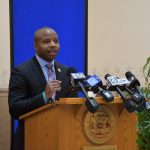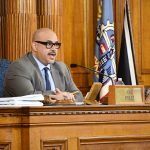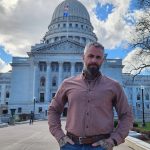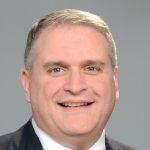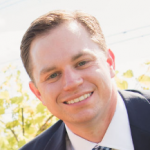Neikrug/Levy world premiere
Todd Levy, principal clarinetist of the Milwaukee Symphony, spends his summers as principal in the Santa Fe (N.M.) Opera orchestra. Composer Marc Neikrug directs the Santa Fe Chamber Music Festival and has lived in the resort city for nearly 20 years. The two musicians met in 2002 and became friends over the years.
In the summer of 2008, Levy happened to spot sketches for a clarinet concerto lying about in Neikrug’s studio. Levy asked to take them home and play through them. He liked what he heard.
“I told him it might be nice to finish it so I could play it,” Levy said, in an interview Monday (March 8).
Neikrug, 63, finished the piece last May. Levy learned it in Santa Fe last summer, with the composer conveniently nearby.
“I played it for him a couple of times, and that was helpful, to get the emotional lay of the land,” Levy said.
Neikrug started working on the concerto in 2004, as a side project without a commission and with no particular goal.
“In between deadlines, you’re always pondering something,” he said, in an interview Wednesday (March 10) in Milwaukee. “A piece can become something like a diary. Something about the clarinet was in my ear, so I was sketching little bits. The makings of a clarinet concerto were lying around. Todd saw them and persuaded me to finish it.”
Levy knew Neikrug’s music before he met the man. He had played Through Roses, a sort of accompanied play about a former concentration camp inmate who survived the Holocaust. The Nazis kept him around to play the violin as they marched their victims to mass murder.
The present concerto has no such explicit program, but it is no giddy showpiece.
“I can’t be light,” he said. “I wish I could be Rossini, but that’s not me.
“I try to go deep. I want to deal profoundly with real human conditions and emotions. I want to express deep communal feelings, and I want people to feel as if they’ve been immersed in some conductivity of life. I want to write music that I believe is important and profound. I’m writing music for the long run. If someone listens to one of my pieces and understands what it’s about spiritually and emotionally, that’s the key for me.”
For many years, Neikrug lived in New York and made his living mostly by playing the piano. He was Pinchas Zukerman’s regular recital partner, for example. About 20 years, he decided to quit the New York musical rat race. At the time, he was commuting between New York and New Mexico to research the topic of his 1988 opera, Los Alamos.
“It was about physicists and Indians,” he said. “And it was 25 years before John Adams.”
(Acutally, Neikrug’s opera premiered 13 years before Adams’ Doctor Atomic, but the point remains. By chance, Adams’ Doctor Atomic Symphony, based on music from the opera, is on this MSO program.)
In the course of many trips west, Neikrug came to know a Pueblo Indian family and eventually married into it. That changed his life.
“New York is exhilarating,” he said. “You can convince yourself that what people think in 20 square blocks on the Upper West Side is the only thing that matters. My family in New Mexico opened my eyes. They’re artists — sculptors, potters, poets — but there is no word for art in their language. They make beautiful things because beauty ought to be part of our world.”
Neikrug found Santa Fe conducive to composing and lived there for 12 years before the Chamber Music Festival job came his way. That allowed him to give up piano playing as a main income.
“It took away the travel,” he said, “and the practice. I hate practicing.”
He traveled to Milwaukee, to a certain extent, to discover whether and where he screwed up in his Clarinet Concerto.
“You have a special sound in your head, and you get it down and arrange it this way and that way,” he said. “It’s musical memory. Can you remember just how these instruments sound together? You try to imagine it, and imagination can play little tricks on you. After all these years, I’m still not altogether clear on how loud a trumpet it. A lot of balances get adjusted.
“I just need to hear every piece played well one time. Then I can move on. When I hear it played well once, I know whether it’s me or them. Now is my moment of anxiety.”
Concert times are 11:15 a.m. Friday and 8 p.m. Saturday (March 12-13) at Marcus Center Uihlein Hall, 929 N. Water St. Tickets are $24-$77 Friday and $25 to $93 Saturday. Visit the MSO website, call the orchestra’s ticket line, 414-291-7605, or call the Marcus box office, 414-273-7206. The program: Neikrug’s Clarinet Concerto, Adams’ Doctor Atomic Symphony, Gershwin’s American in Paris and Copland’s El Salon Mexico.



